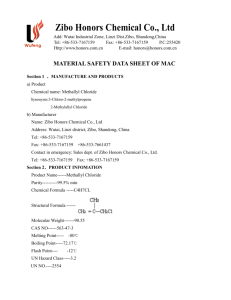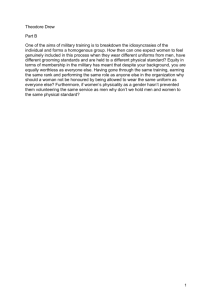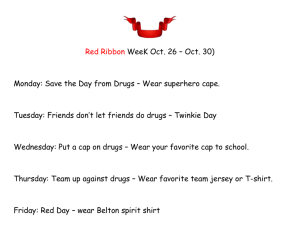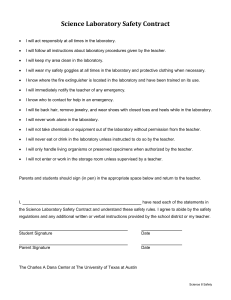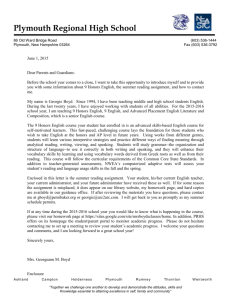淄博澳纳斯化工有限公司 - Zibo Honors chemical co.,ltd.
advertisement
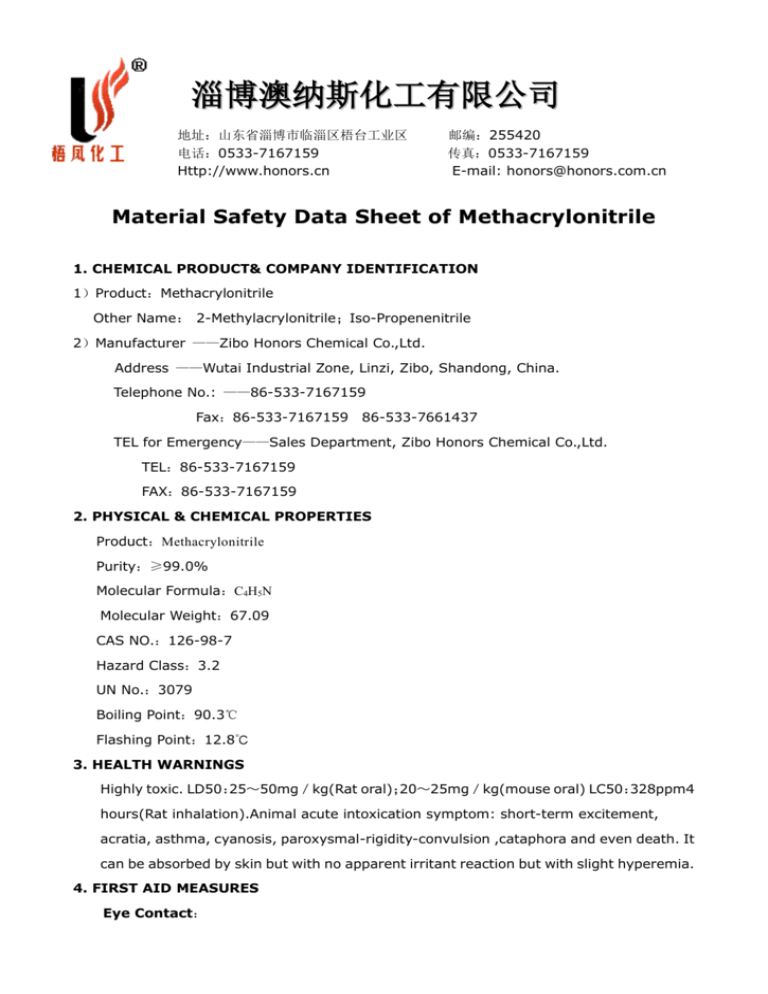
淄博澳纳斯化工有限公司 地址:山东省淄博市临淄区梧台工业区 电话:0533-7167159 Http://www.honors.cn 邮编:255420 传真:0533-7167159 E-mail: honors@honors.com.cn Material Safety Data Sheet of Methacrylonitrile 1. CHEMICAL PRODUCT& COMPANY IDENTIFICATION 1)Product:Methacrylonitrile Other Name: 2-Methylacrylonitrile;Iso-Propenenitrile 2)Manufacturer ——Zibo Honors Chemical Co.,Ltd. Address ——Wutai Industrial Zone, Linzi, Zibo, Shandong, China. Telephone No.: ——86-533-7167159 Fax:86-533-7167159 86-533-7661437 TEL for Emergency——Sales Department, Zibo Honors Chemical Co.,Ltd. TEL:86-533-7167159 FAX:86-533-7167159 2. PHYSICAL & CHEMICAL PROPERTIES Product:Methacrylonitrile Purity:≥99.0% Molecular Formula:C4H5N Molecular Weight:67.09 CAS NO.:126-98-7 Hazard Class:3.2 UN No.:3079 Boiling Point:90.3℃ Flashing Point:12.8℃ 3. HEALTH WARNINGS Highly toxic. LD50:25~50mg/kg(Rat oral);20~25mg/kg(mouse oral) LC50:328ppm4 hours(Rat inhalation).Animal acute intoxication symptom: short-term excitement, acratia, asthma, cyanosis, paroxysmal-rigidity-convulsion ,cataphora and even death. It can be absorbed by skin but with no apparent irritant reaction but with slight hyperemia. 4. FIRST AID MEASURES Eye Contact: Flush with plenty of water for at least 15 minutes. Seek medical attention. Skin Contact: Take off all contaminated clothes and shoes,flush with plenty of water, turn to doctors. Make sure that the doctors learned about their own personal protect measures. Ingestion: Give gastric lavage with 1:5000 potassium permanganate or 5% sodium hyposulfite. Seek medical attention. Inhalation: Move the patient immediately to fresh air. Give artificial respiration if not breathing, Give oxygen if breathing difficultly. Turn to doctors. 5. FIRE FIGHTING MEASURES Dangerous properties: Flashing Point:12.9℃ Blast limit: 2%-6.8% Cautions: Vapor of this material mixed with air would be explosive. It may blast meeting fire and heat. It would have violent reaction with oxidant. Its vapor is heavier than air, and can spread far in the low areas. Vapors accumulate and ignite when meeting fire. Heat would cause polymerization and release plenty of heat which would lead to leak and blast. Extinguishing method: Wear full protective clothing including helmet and face mask standing at the uptake of the wind to fight with the fire. Firefighters withdraw immediately if contact with the material and wash thoroughly. Warn the downstream if this material or the contaminated water flow into rivers Use water spray to cool unopened containers. Extinguishing Media: foam, carbon dioxide, fire extinguishing agent 1211or sand. Water may be ineffective. 6. ACCIDENTAL RELEASE, SPILL, LEAK PROCRDURES Persons withdraw immediately to safe area, insulate the contaminated area. Stop entry to the area. Eliminate source of fire. Emergency-handling staff should wear cotton protective clothing with self-contained positive pressure breathing apparatus. Do not contact directly with the leaks. Try eliminating the leaking sources. Prevent the material from accessing to any confined spaces, public sewers or waterways. For small leak, absorb with sand ,vermiculite or other inertia material. For large leak, dam or dig to contain the material. Pumping the material to tanks or special collectors for recycling or disposing to appropriate place. 7. HANDLING & STORAGE Stabilizer should be added to the material. Electrical equipment must be of explosion-proof construction and grounded. Keep away from direct sunlight to prevent polymerization reaction. Store in ventilated, cool dark place, with the container cap facing upward. Keep away from ignition sources, Keep away from oxidizing materials and other incompatible materials. Always keep container closed airtight, and provide local exhaust ventilation. Avoid tumbling, dropping, dragging or other rough handling of full or emptied container, both before and after use. Wash hands and any other bare skin area thoroughly immediately after handling or contact, and remove any contaminated clothing. Transporting must be in designated route, do not stop on the way. 8.EXPOSURE CONTROLS/ PERSONAL PROTECTION Respiratory Protection: Wear respiratory protection. Avoid breathing vapors, mist or gas. Ensure adequate ventilation. Remove all sources of ignition. Evacuate personnel to safe areas. Beware of vapors accumulating to form explosive concentrations. Vapors can accumulate in low areas. Eye Protection: Wear chemical- safety glasses. Skin and body Protection: Wear anti-static-electricity working suit. Hand Protection: Wear impervious gloves. Other protections: Smoking, eating and drinking forbidden in the working field. Washing hands before meals. Take a bath after handling the material. 9. PHYSICAL & CHEMICAL PROPERTIES Physical State: colorless with slight almond odor. Vapor Pressure 5.33kPa/12.8℃ Boiling Point:90.3℃. Density:0.80 Solubility:2.57g/100g soluble in water at 20℃, mixable in acetone octane and methylbenzene at 20℃-25℃ . 10. STABILITY & REACTIVITY Stable at normal conditions, but flammable. Keep away from heat and fire. Keep away from strong oxidizing agents. There is possible dangerous polymerization. 11. TOXICOLOGICAL INFORMATION LD50:25~50mg/kg(Rat oral);20~25mg/kg(mouse oral) LC50:328ppm4 hours(Rat inhalation). 12. ECOLOGICAL INFORMATION N/A 13. DISPOSE INFORMATION Burn in a chemical incinerator equipped with an afterburner and scrubber but exert extra care in igniting as this material is highly flammable. Offer surplus and non-recyclable solutions to a licensed disposal company. Contact a licensed professional waste disposal service to dispose of this material. 14. TRANSPORT INFORMATION Hazard Class:3.2 UN NO.:3079 Package:I To be packaged with 200L PE drum (or UN iron drum) Net weight to be 180 kgs/drum. Keep leak-proof and stored in dry, cool place during transportation. 15. LEGISLATIVE INFORMATION The use , production, storage, transport, load and unload of this chemical should be according to regulates fix by chemical administrative in China. The material was allocated as 3.2 class mid-flash flammable liquid according to classification & tag of dangerous chemicals (GB13690-92). 16. OTHER INFORMATION References: Filled BY: Examination: Mending Information:


